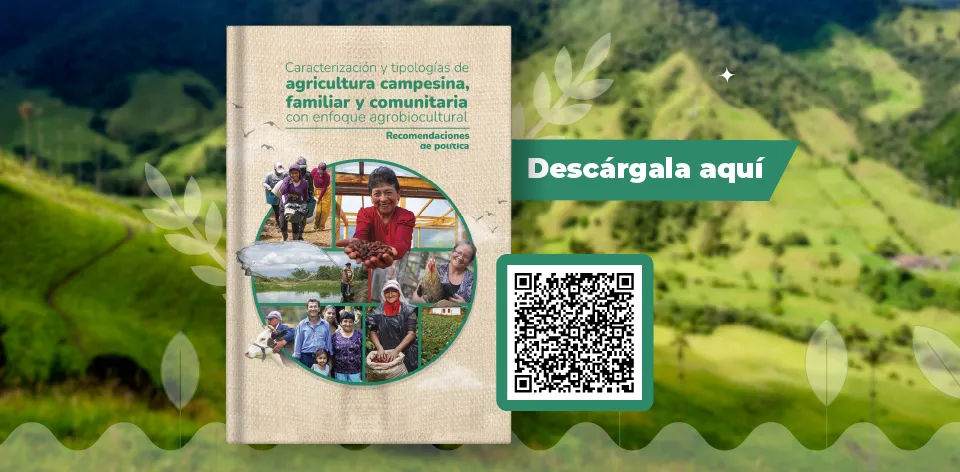 4/6/2024
4/6/2024
Results of the Characterization and Typologies of Peasant, Family, and Community Agriculture that will Focus Agricultural Public Policy

Peasant, family, and community agriculture (ACFC) contributes 70% of food production in Colombia.
According to the Information System for Rural Agricultural Planning (SIPRA), the departments with the highest presence are Boyacá, Cundinamarca, Antioquia, Nariño, and Cauca.
Bogotá D. C., (@Minagricultura, @UPRAColombia, @claudialili76). On the occasion of Peasant Day, commemorated on June 2nd in Chiquinquirá, Boyacá, the Director of the Rural Agricultural Planning Unit (UPRA), Claudia Liliana Cortés, launched the document titled "Characterization and Typologies of Peasant, Family, and Community Agriculture, with an Agrobiocultural Approach." This study offers a detailed analysis and tools to understand and strengthen the fundamental role of this agricultural model, which is crucial for social cohesion, cultural preservation, and environmental sustainability in Colombia's rural areas.
"UPRA makes this document available to the Ministry of Agriculture and all related entities; it serves as a public policy focal point that allows us to quickly reach those who have these characteristics and need state support. The four types of ACFC we identified measure the intensity of four variables: family self-consumption, market integration, technology level, and use of external labor without losing family labor," stated Claudia Liliana Cortés, Director of UPRA.
The study also identified at least 55 agrobiocultural subjects, indicating that public policies must be designed from the territories and with organizations and communities as protagonists. Recognizing this diversity in peasant, ethnic, family, and community livelihoods not only contributes to their cultural heritage and strengthens agro-food processes but is also essential for finding solutions to challenges such as climate change, biodiversity protection, local development, and the conservation of the nation's biocultural heritage.
Additionally, this publication addresses the pressures and losses of area and cultural identity that ACFC faces due to land-use changes, changes in the economic purpose of properties, the fragmentation of rural agricultural land, and the expansion of urban land.
According to Resolution 464 of 2017, "Peasant, family, and community agriculture consists of women, men, families, and peasant, indigenous, black, Afro-descendant, Raizal, and Palenquero communities that live in the rural territories of the country. This system primarily develops activities of production, transformation, and commercialization of agricultural, livestock, fishery, aquaculture, and forestry goods and services, which are often complemented with non-agricultural activities. This diversification of activities and livelihoods is predominantly carried out through family, associative, or community management and work, although hired labor can also be used. The territory and the actors that manage this system are closely linked and co-evolve, combining economic, social, ecological, political, and cultural functions."
To delve deeper into this topic, we invite you to listen to the latest episode of our podcast "UPRA: We Plan the Countryside: 'A Look at the Characterization of Peasant, Family, and Community Agriculture'.
ou can consult this publication on the website www.upra.gov.co or click HERE.

